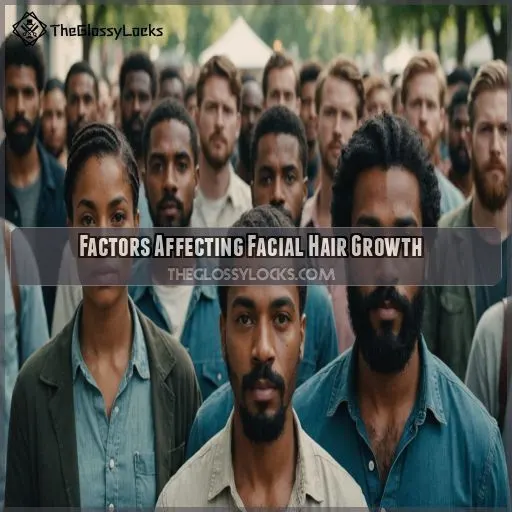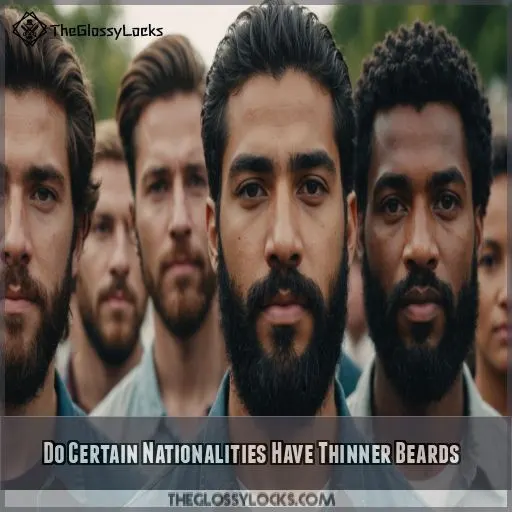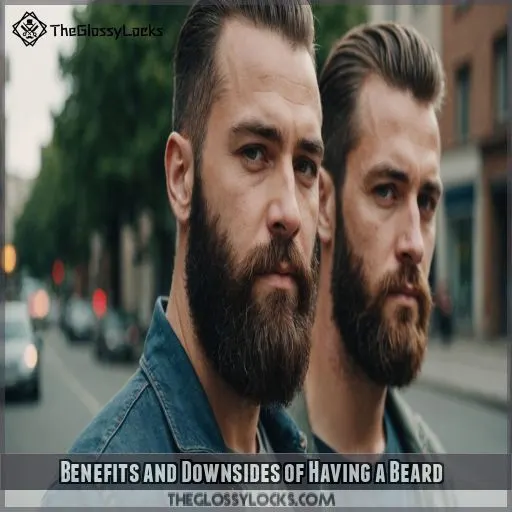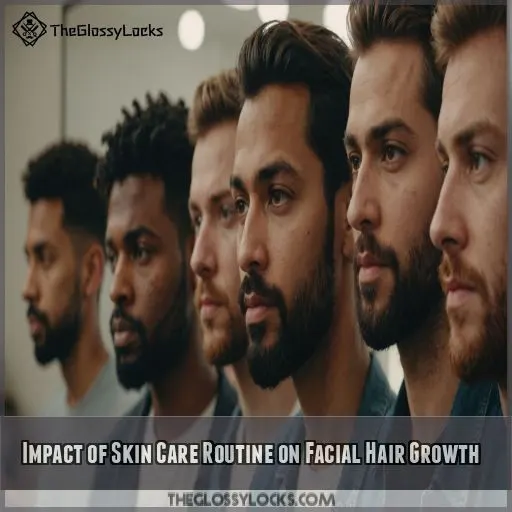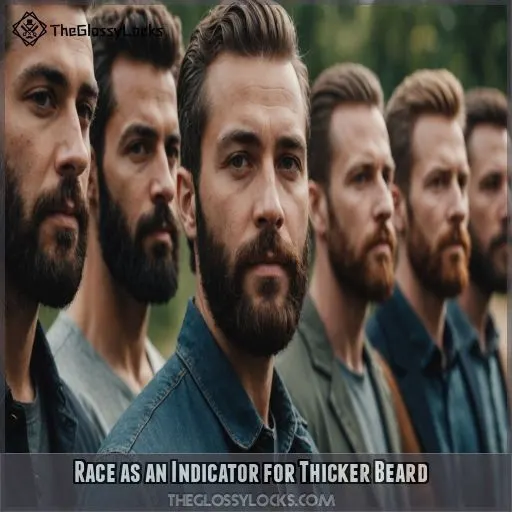This site is supported by our readers. We may earn a commission, at no cost to you, if you purchase through links.
 You might be wondering if there are ethnicities that can’t grow facial hair.
You might be wondering if there are ethnicities that can’t grow facial hair.
There’s no magical "beardless" ethnicity, but some folks, like those from East Asian backgrounds (think Japanese or Chinese), often find themselves with less facial fuzz than, say, Mediterranean men.
It’s all in the genes, a bit like inheriting Aunt Edna’s curly hair.
So, if your ancestors hail from regions where beards are thin, don’t fret—focus on rocking your own unique style.
And remember, whether you’re aiming for a dashing mustache or a Viking beard, there’s always more to learn about making the most of what you’ve got!
Table Of Contents
- Key Takeaways
- Who Can’t Grow Facial Hair
- Factors Affecting Facial Hair Growth
- Do Certain Nationalities Have Thinner Beards
- Benefits and Downsides of Having a Beard
- Impact of Skin Care Routine on Facial Hair Growth
- Race as an Indicator for Thicker Beard
- Frequently Asked Questions (FAQs)
- What nationality can’t grow facial hair?
- Who can’t grow facial hair?
- What ethnicities don’t grow body hair?
- What countries can’t grow beards?
- What role does age play in beard growth?
- Can alopecia areata cause uneven beard loss?
- Does smoking impact the health of facial hair?
- How does stress affect beard growth?
- Are there treatments for patchy beard growth?
- Conclusion
Key Takeaways
- Your genes decide your beard destiny, so if you’re from East Asian or Native American backgrounds, you might find your facial hair playing hide-and-seek. Don’t fret; it’s like inheriting your great aunt’s crochet skills instead of her knitting expertise.
- Hormones are the ringleaders in beard growth, and things like thyroid issues or low testosterone might make your whiskers feel like they’re on a permanent vacation. So, think of your hormones as the unruly kids at a birthday party – sometimes you need to give them a little extra attention to get them to behave.
- Growing a beard isn’t just about genetics or hormones; it’s a full-time job, and you can experiment with different styles virtually.
. You’ve got to keep that face in tip-top shape with a good skincare routine. Think of your face as a garden that needs TLC – a little cleansing, beard oil, and exfoliating can turn any patchy mess into a lush forest.
- Wondering if you’ve drawn the short straw in the beard lottery? It’s not a nationality thing, but genetics and race do play a role in how thick that face mane gets. Just remember, whether your facial fuzz is more like a whisper or a Viking shout, owning your unique style is the ultimate win.
Who Can’t Grow Facial Hair
You might be surprised to learn that some folks just can’t grow a beard due to tricky genetic factors and hormonal imbalances. Even racial differences come into play, making facial hair growth as diverse as we are!
Men With Certain Genetic Disorders
If you’ve ever wondered why some men can’t grow facial hair, genetic disorders like androgen insensitivity or Klinefelter syndrome can be culprits, but beard growth factors can also play a role.
.
These disorders are like a faulty lock, leaving facial hair growth parked for an extended staycation.
The androgen receptor gene in these cases is like a faulty lock, leaving facial hair growth parked for an extended staycation.
Alopecia areata might also wave goodbye to your whiskers.
Effects of Hormonal Imbalances on Beard Growth
If you’re struggling with beard growth, blame those wild hormones!
Hormonal imbalances like thyroid issues or testosterone deficiency can make beard density as elusive as finding a needle in a haystack.
Some folks, bitten by the PCOS bug, also notice facial hair development taking a backseat.
Hormonal therapy and hair loss treatments might be your co-pilot in this hairy journey.
Racial Differences in Facial Hair Growth
You may be surprised to learn that your ethnic background can play a big role in how thick and full your beard grows. Certain races, like Mediterranean men, tend to have lush, bushy beards, while others, like Chinese guys, often struggle with patchy facial hair. Don’t worry though – with the right care routine, you can maximize your beard’s potential!
Factors Affecting Facial Hair Growth
You’re curious about why some guys seem to struggle with beard growth while others effortlessly sport thick facial hair, and you’re wondering if maybe what you eat might have something to do with it.
. Don’t worry, everything from age, testosterone levels, and even your skin care routine could be behind those thin whiskers!
Age and Beard Development
From patchy beginnings to full-on lumberjack vibes, beard growth stages are a wild ride. During puberty, your face might sprout an awkward garden of fuzz, but hold tight—by your thirties, your beard growth timeline should settle down. Embrace your inner Gandalf as older men notice refined beard growth patterns. Patience is key; no beard growth kit works overnight!
How Testosterone Affects Beard Growth
Testosterone levels can either be your best buddy or a sneaky thief when it comes to beard growth. You’ve passed the age stage, now let’s tackle hormones. Here are the mischief-makers:
- DHT and hair follicles’ sensitivity.
- Low T effects leaving you floundering in fuzz.
- Hair growth cycle acting like a snail on vacation.
Importance of Skin and Hair Care Routine
Don’t skimp on your skincare, fellas – it’s the secret to a lush, healthy beard! Cleanse that mug regularly to prevent clogged pores and ingrown hairs. Slather on some beard oil and balm to nourish and condition those luscious locks. Trust me, your face will thank you for the extra TLC.
Dietary Considerations for Beard Health
Taking care of your skin and hair routine is just the tip of the iceberg for beard health. Fuel that facial forest with the right diet! Consider adding:
- Protein intake: Eggs and lean meats are beard’s best friends.
- Vitamins for beards: Load up on fruits and veggies.
- Omega-3 fatty acids: Fish is fabulous for follicle prowess.
Lifestyle Changes for Improving Facial Hair
Ready to boost your beard game? Let’s shake things up! Exercise helps pump up your guns but also revs up testosterone. Stay hydrated and well-fed with a balanced diet. Dont skimp on beauty sleep! Pamper your face with beard oil, beard balm, and wash it with beard shampoo. Stress management? Essential. Get a beard brush and comb too. Voil!
Do Certain Nationalities Have Thinner Beards
Ever wondered why your friend’s beard looks like a luscious forest while yours barely qualifies as scruff? From Indian to Mediterranean to Chinese, different nationalities battle (or embrace) their own unique beard stories, and it’s not just genetics pulling the strings!
Indian Vs Chinese Vs Mediterranean Beards
Wondering why your beard isn’t as thick as your Mediterranean buddy’s? Don’t sweat it – genetics play a huge role. Guys from certain regions, like India and China, tend to have less facial hair growth. But that doesn’t mean you can’t rock a stylish beard. Just focus on proper grooming and embrace your unique look.
Regional and Ethnic Differences in Facial Hair Growth
So, you’re wondering if certain nationalities rock thinner beards? Well, you’re not alone. It’s like the beard lottery—genetics decides your facial hair fate. Mediterranean men often flaunt thick beards, while Chinese men usually have finer growth. But hey, you’re not bound by your roots. With the right beard products, even the "beard obsessed" can enhance their look!
Surprising Beard Trends From Around the World
Beard styles can vary as much as global cuisine! The world’s got some fascinating facial hair history and trends. Did you know?
- Viking Beards: Powerful and untamed, embodying raw strength.
- French Goatees: Chic and oh-so-sophisticated.
- Indian Mustaches: Majestic, with significant cultural importance.
- Japanese Minimalism: Sleek, understated, and precise.
Facial hair truly is a canvas for cultural expression.
Tips for Stimulating Facial Hair in Your Ancestors
Understanding your family history might feel like opening Pandora’s box for why certain ethnicities can’t grow facial hair understanding beard growth.
. Let’s debunk beard growth myths and look at ancient beard remedies hair growth facts.
! Try a healthy lifestyle with renowned tools like beard wax and conditioner. Who says a beard razor can’t tickle history? Genetic testing could reveal secrets of ethnicity and beard growth.
Benefits and Downsides of Having a Beard
While having a beard may seem like a no-brainer, there are actually some surprising downsides to think about. From medical restrictions to employment regulations, the decision to grow facial hair isn’t always as simple as it seems.
Reasons for Not Shaving or Waxing Your Face
If you’re thinking about your facial hair, not shaving or waxing might just be your winning strategy. Think of it as letting your beard run wild and free! There are reasons aplenty: skin sensitivities, cultural norms, personal preference, or religious beliefs. Oh, and let’s not forget those intricate grooming rituals – sometimes, it’s best to embrace the untamed look!
Medical Reasons to Not Have Facial Hair
You might think having a beard is just about style, but sometimes, it’s best to keep things clean-shaven. Medical reasons? Here’s the scoop:
- Hormonal disorders: These can mess with growth.
- Thyroid issues: They might thin your beard.
- Alopecia areata: Causes patchy spots.
- Skin conditions and medications: They can irritate your face.
Embrace the clean look, maybe?
Employment Regulations Around Beard Growing
Figuring out beard grooming policies at work can feel like tiptoeing through a minefield!
Some workplaces enforce strict military regulations, others grapple with workplace bias.
Safety concerns might demand a clean shave, but hey, there’s room for religious exemptions.
Understand your company’s expectations and assert your style wisely.
Blend safety and self-expression like a pro in the bearded ballet of workplace etiquette.
Impact of Skin Care Routine on Facial Hair Growth
(Source) Maintaining a healthy skin care routine is key to supporting your facial hair growth.
Start by cleansing your face regularly to prevent clogged pores and ingrown hairs, which can hinder beard development.
Follow up with a nourishing beard oil or balm to hydrate and condition the hair.
Don’t forget to exfoliate a few times a week – this removes dead skin cells and allows new growth to emerge.
A gentle facial scrub or dermaplaning can work wonders.
By keeping your skin healthy, you’re creating the best environment for a thick, lush beard.
Consistency is key, so stick to your routine and watch your facial hair flourish.
Race as an Indicator for Thicker Beard
You’ve got your skincare routine in check, but what about the role of race in beard growth? It’s not just about lotions; your genes hold the secret to your facial hair’s personality! Here’s the buzz on how race can influence beard thickness: Beard Growth and Age.
- Genetics: Like a family heirloom, the sensitivity of your hair follicles to growth hormones depends largely on your genetic background.
- Culture: Ethnic groups celebrate and flaunt different facial hair growth patterns—each as unique as a snowflake!
- Hair Follicles: Mediterranean men often sport thicker beards, thanks to their hair follicles being more responsive to hormones.
- Hormones: Hormones play their part, but race and genes take the lead role.
You’ve got beard-envy under control now, haven’t you?
Frequently Asked Questions (FAQs)
What nationality can’t grow facial hair?
(Source) Ah, the age-old quest for a lush, full beard – a symbol of rugged masculinity that some ethnicities just can’t seem to achieve. But don’t worry, my friend, your genetics aren’t destiny. With the right care and a little patience, even the most stubborn follicles can blossom into a magnificent mane.
Who can’t grow facial hair?
If your face stays smoother than a politician’s promise, it might be your genes or lower androgen levels holding back your facial forest. Some East Asian and Native American men naturally see sparse growth due to genetics.
What ethnicities don’t grow body hair?
You might wonder if some ethnicities just can’t grow much body hair. Generally, people from East Asian or Native American backgrounds tend to have less body hair compared to Caucasians or people of Mediterranean descent. Fascinating, huh?
What countries can’t grow beards?
Beard growth isn’t limited by specific countries but by genetics. People from regions like East Asia may have less facial hair due to genetic factors. You won’t find a country where beards are completely absent.
What role does age play in beard growth?
As you get older, your beard growth may slow down a bit, but don’t worry – with the right care and patience, you can still rock a killer beard well into your golden years! (Source)
Can alopecia areata cause uneven beard loss?
Alopecia areata can definitely give your beard a run for its money, creating patchy spots by turning your immune system against your hair follicles. Treatments, though, can help tame the ferocious follicle battle. Stay confident!
Does smoking impact the health of facial hair?
Smoking can harm your facial hair by reducing blood flow and causing damage to hair follicles. It’s like putting your beard growth on a diet, starving it of the nutrients needed for its fullest potential .
How does stress affect beard growth?
Stress can throttle your beard’s growth like a gremlin on your facial hair engine. It spikes cortisol, hampers testosterone, and hair might jump ship to the resting phase. Manage stress to keep your beard thriving .
Are there treatments for patchy beard growth?
Think of your beard as a sleepy garden needing some TLC! Treatments like minoxidil, hormone therapy, and microneedling can awaken those stubborn patches. Show your face some love with good skincare, and watch it flourish.
Conclusion
Ever wonder why some people seem to struggle more with facial hair growth?
While ethnicities that can’t grow facial hair don’t actually exist, genetic variations play a significant role.
If you’re part of a group with typically thinner beards, embrace it—after all, beard envy doesn’t suit anyone!
Focus on a healthy grooming routine and lifestyle choices that suit your individuality, and rock your own style with confidence and flair.


